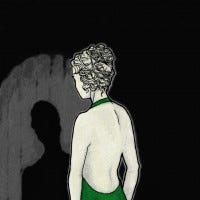In-Depth: Character Creation, Gender And Fallout 3
Looking back at Bethesda's much-acclaimed 2008 title Fallout 3, writer Emily Short examines the post-apocalyptic game's storytelling in-depth, from pacing to gender possibilities for the protagonist.

[Looking back at Bethesda's much-acclaimed 2008 title Fallout 3, writer Emily Short examines the post-apocalyptic game's storytelling in-depth, from pacing to gender possibilities for the protagonist.] This January and February I estimate I spent somewhere between sixty and eighty hours with Fallout 3. I must have liked it. There were various flaws -- the sameyness of the setting after enough hours being a prominent one. Then there was the implausible world-building: after two hundred years, you're telling me there's still edible, unlooted food in the grocery stores? But one forgives those things because one has to. In any case, I couldn't help but be impressed by the degree to which my story in Fallout 3 felt like it was something unique, probably a lot different from someone else's story. Some of that had to do with the way the player is allowed to control the features of storytelling -- pace, exposition, rate at which the backstory is uncovered. Some of it had to do with the direct control over the protagonist's choices. Oddly, it was most often the former aspect that I found narratively meaningful, while intentional choices often let me down. Pace The thing I admired most about the storytelling in Fallout 3 was the generous way it lets the player decide the pace of the main story, by offering both a clearly demarcated major quest line and a near-inexhaustible supply of subordinate quest material. I've several times heard authors of conventional fiction assert that the problem with interactive narrative is that you can't control pace at all. In a sense that's true; in another sense, there's a lot to be gained by letting the player decide how much diversion he wants -- whether he wants to play the story as a tight cohesive short story or as a big rambling novel, a Michener-esque handling of Apocalyptic Wasteland. I can't remember ever playing another game that had so much purely optional material to offer. Environmental Storytelling Maybe "environmental storytelling" is becoming a buzz-phrase. There were two separate GDC 2010 talks on the way environment can carry narrative information: "What Happened Here?: Environmental Storytelling" by Matthias Worch and Harvey Smith; and "Environmental Narrative: Your World is Your Story" by Richard Rouse III. That's justified: story-as-told-by-place is something that mainstream games are getting increasingly good at. Fallout 3 is exceptionally rich in this kind of storytelling, though it's worth pointing out that environmental storytelling is almost always backstory-telling: it's about what has happened here, not about what is happening or might happen in the future. That works for Fallout 3 because, in apocalyptic wastelands, most of the present is about the past, so that's all right. And it goes together well with the player-controlled pacing of the main plot, because it means that there is also player-controlled pacing of exposition. It's as though when you had Moby Dick assigned to you in high school, you were allowed to do the chapters on whaling as an interactive diorama sequence, and you got to skip the encyclopedic chapter on ambergris entirely. Well, except that in Moby Dick that stuff did have a thematic point. There isn't always a thematic coherence to Fallout 3, except possibly on the very loose theme that a mutant-infested wasteland is not a nice place and life there is hard. There's one respect in which the environmental storytelling extends to the game-play present, though: the radios that refer to the protagonist's exploits and the reputation that builds around her. (Or him. But I played a her.) The broadcasts here worked better for me than the similar elements in Fable 2, where villagers would sometimes discuss me -- perhaps because Fallout 3's broadcasts seemed more particular and more often keyed to really significant choices and events in the protagonist's life. Characterization Speaking of character choices, I wish RPGs would allow me to make decisions about my character not at a clump in the beginning, but at the moment when those decisions become interesting. Example: Fallout 3 concerns a man who has made significant sacrifices in order to offer a safe and healthy life to his daughter (or son -- the protagonist, in any case). Up to the point where I discovered that bit of backstory, I had been playing my character in the default mode that I use for all RPGs: with an emphasis on intelligence, ranged weaponry, and any skills that look like they'll get me out of tedious melee fight sequences; generally friendly and ethical, except when the dialogue tree offers me something irresistably sarcastic to say to a character who is irresistably annoying. When I found out about Dad's sacrifice, though, I immediately wished I'd chosen differently. It would have been much more creepy and compelling from the point of view of story if, actually, his daughter was a sociopathic monster. That would produce a much darker narrative, perhaps with a bit of a theme about not investing too much hope or ambition in any single person besides yourself. But by the point in the story where it's a narratively interesting question what ethical character you have, you've already made a lot of fundamental choices and established quite a lot of karma. The overly simplistic good/bad scale doesn't entirely help matters either, because as with every game that has simple good/bad karma, I find that the game's idea of virtue and vice misses my own idea entirely. Gender Fail Speaking of player-directed characterization, the game universe did not seem to have been constructed to account for my protagonist being female. Women sort-of flirted with my character; men treated her with male-to-male-style aggression. (I'm not the only person to notice this, I know.) It's possible to imagine an interesting version of the wasteland in which most women are lesbians, but pretty clearly the game world hadn't developed this way intentionally. The whole time I was playing, the social interactions kept reminding me that being female was the "other" choice, the marked choice, the non-default; the thing they didn't bother to write for or program until last. Matters could be much worse. At least Fallout 3 didn't, like Heavy Rain, establish the sole female protagonist with a leeringly detailed near-rape scene and then go on exploiting her sexual risk for the entire rest of the narrative. So at least the female option isn't written in there with the obvious intention of providing amusement to men; it's just equally obviously an afterthought. It doesn't have to be that way -- and making it different doesn't have to mean setting all stories in a perfectly egalitarian society, either. One of my favorite examples of player-selected gender is in the interactive fiction Bolivia By Night, in which the player's choice of gender (and also of nationality, interestingly) affects the attitudes of the non-player characters. Sometimes being a girl makes the other characters treat you in sexist, unpleasant ways. But this is so clearly a characterization that it's not the game being sexist, it's the game being (in part) about sexism. Other characters also have comments about your being (say) American. The choice of gender becomes a new way to explore the setting and narrative created in the game; it's not arbitrary, and it definitely isn't an afterthought. Character Creation I'm not arguing here against letting people choose protagonist characteristics; not at all. It's more that the more RPGs I play, the more I'm struck by the essential sameness of the characters I tend to create, because the characteristics available for modification are so predictable, even if they are filtered to some degree by the nature of the setting. But I would make different and more interesting choices if, instead of doing character-building in a clump at the beginning, that process were more gradual. I admit I felt this way even more strongly after the stunningly longwinded character creation processes in Dragon Age and Mass Effect. Fallout 3 does, of course, allow you to add some special abilities as you level up, which is a nice touch -- but a lot of character fundamentals are established right at the outset, before you've had any chance to understand what those choices mean in this place and this story. (Disclosure: I played a copy of this work that I purchased at full price. I have had no commercial affiliations with the publisher at the time of writing.) [Emily Short is an interactive fiction author and part of the team behind Inform 7, a language for IF creation. She also maintains a blog on interactive fiction and related topics. She also contracts for story and design work with game developers from time to time, and will disclose conflicts with story subjects if any exist. She can be reached at emshort AT mindspring DOT com.]
About the Author(s)
You May Also Like







.jpeg?width=700&auto=webp&quality=80&disable=upscale)








